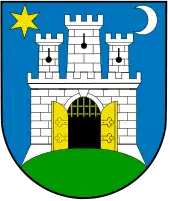Peščenica – Žitnjak
Peščenica – Žitnjak (Croatian pronunciation: [peʃt͡ʃeˈnit͡sa ˈʒitɲak]) is a city district in the southeastern part of Zagreb, Croatia.[1] It consists of two parts: Peščenica, a set of neighborhoods; and Žitnjak, a large industrial zone on the city outskirts, and has a total population of 56,487 (2011 census).[2]
.svg.png.webp)
The smaller neighbourhoods that form the core of Peščenica include:
- Stara Peščenica
- Donje Svetice
- Volovčica
- Ferenščica
These neighborhoods are delineated by major city arterials, such as the Slavonska Avenue and Vukovarska Avenue.
To the northeast, towards Donja Dubrava, there are:
- Borongaj (local administration "Bruno Bušić")
- Borongaj Lugovi
- Vukomerec
To the southwest, towards Trnje, there are:
- Borovje
- Folnegovićevo naselje
- local administration "Oton Župančić"
The places in the outer rim, around and beyond Žitnjak, include:
- Kozari Bok
- Kozari putevi
- Savica–Šanci
- Petruševec
- Resnik
- Ivanja Reka
- Žitnjak (Struge)
History
Stara Peščenica and Volovčica were first planned in 1913 and built after World War I. Donje Svetice, Ferenščica, Borongaj, Folnegovićevo naselje and Vukomerec were started then and built up mostly after World War II.
Žitnjak is named after wheat (Croatian: žito), as it used to be the location of wheat fields. In 1865, it was a small settlement of 10 houses and 177 inhabitants. After World War II, it became an industrial zone.[3]
Resnik and Ivanja Reka were previously villages, and their first mention dates from 1217. They were urbanized after World War II, particularly in the 1980s.
Ivanja Reka remains a standalone settlement, but Resnik stopped being tracked as one after 1971, when it had 456 residents.[4][5]
Peščenica has been made famous locally by its resident and self-proclaimed president of the "Republic of Peščenica" Željko Malnar, a maverick traveler, author and talk show host.
References
- "Mjesna samouprava - Gradska četvrt Peščenica - Žitnjak - Mjesni odbori" (in Croatian). City of Zagreb. Retrieved 2010-12-09.
- "Population by Age and Sex, by Districts of City of Zagreb, 2011 Census". Census of Population, Households and Dwellings 2011. Zagreb: Croatian Bureau of Statistics. December 2012.
- Bilić, Josip; Ivanković, Hrvoje, eds. (2006). "Žitnjak". Zagrebački leksikon (in Croatian). Zagreb: Miroslav Krleža Institute of Lexicography and Masmedia. ISBN 953-157-486-3.
- Croatian Bureau of Statistics Fusnote - Grad Zagreb
- Croatian Bureau of Statistics Broj stanovnika po bivšim naseljima
